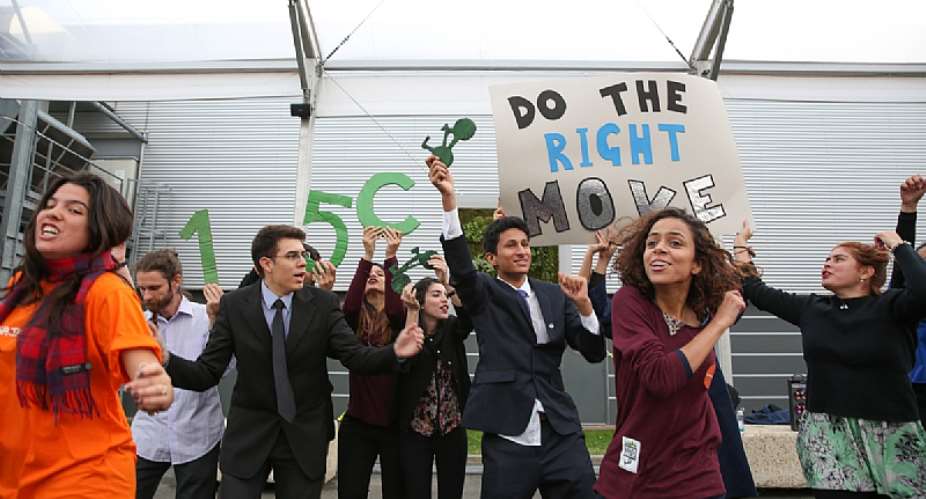In Paris, France- Today- civil society observers warned that new climate talks in Paris could trigger even greater crisis in Africa, if they weren’t careful to protect the rights of poor and vulnerable in the continent most impacted by climate change and provide adequate climate change finance to address the impacts.
The UN talks, lasting two weeks in Paris are focused on increasing climate actions in the near term and on creating a new climate agreement in 2015- to come into effect in 2020.
Right now, the effects of climate change are already being felt by people across Africa. Evidence shows that the change in temperature has affected the health, livelihoods, food productivity, water availability, and overall security of the African people. According to the Climate Change Vulnerability Index for 2015 , seven of the ten countries most at risk from climate change are in Africa.
In North Africa, the 2001 disastrous flood in northern Algeria resulted in about 800 deaths and economic loss of about $400 million. In Mozambique, the 2000 flood (worsened by two cyclones) caused 800 deaths, affected almost 2 million people of which about 1 million needed food, 329,000 people were displaced and agricultural production land was destroyed (AWDR, 2006).
Entire economies suffer when the water levels of Africa’s huge rivers drop. Ghana, for example, has become totally reliant on the hydro-electric output of the Akosombo dam on the river Volta. Mali is dependent on the river Niger for food, water and transport. However, great stretches of the river is now facing environmental devastation as a result of pollution. In Nigeria, half the population has no access to clean water.
Africa has seen a decrease in rainfall over large parts of the Sahel and Southern Africa, and an increase in parts of Central Africa. Over the past 25 years, the number of weather-related disasters, such as floods and droughts, has doubled, resulting in Africa having a higher mortality rate from droughts than any other region. Some 200 million of the poorest people in Africa are food insecure, many through their dependence on climate sensitive livelihoods – predominantly rain‐fed agriculture.
Temperature increases and changes in mean rainfall and evaporation are likely to become ever greater and more damaging to livelihoods. In Africa, recent modeling indicates that a temperature increase of 2oC by 2050 is going to be already catastrophic for Africa. It could mean a loss of 4.7% of GNP, most of it as a result of losses in the agricultural sector. A temperature rise of 2.5oC ‐ 5oC would be worse, resulting in hunger for 128 million; 108 million affected by flooding and a sea‐level rise of 15‐95cm, among other catastrophic impacts.
In Paris, the African continent are demanding equity, fair deal and legally binding agreement as the Secretary of the Climate Change Network and PACJA, Robert Chimambo of Zambia earlier this afternoon reported that countries must be mandated to include contributions on all the elements including provision of money for adaptation for developing countries by developed countries.
According to Mithika Mwenda, Secretary General of Pan African Climate Justice Alliance (PACJA), Africa must stay united and stay strong in Paris climate talks. Any climate change deal that is leading us straight to 30 of warming causing untold problems of hunger, starvation, disasters, conflicts and wars in Africa is not in the interest of the continent and should be rejected. No deal at such point is better than giving legitimacy to a death sentence.
The higher levels of warming under current pledges would lead to greater impacts and damages, and would pose a larger challenge to adaptation, compared to a long-term limit of 1.5 or 2°C. Although the continent contributes only 3.8% of total greenhouse gas emissions, Africa’s countries are among the most vulnerable.
Climate variability lies behind much of the prevailing poverty, food insecurity, and weak economic growth in Africa today. According to Augustine Njamnshi BCDP, Cameroon and Technical/Political Affairs Chair of PACJA, we were promised that emission cuts would be strengthened this year, they weren’t. Instead African countries are been saddled with additional load of paying for climate debt which they least contributed.
In Paris, Africa is calling for equity, fair deal and legally binding agreement.
Fariya Abubakari is the climate tracker for adopt a negotiator Program.





 We’ll no longer tolerate your empty, unwarranted attacks – TUC blasts Prof Adei
We’ll no longer tolerate your empty, unwarranted attacks – TUC blasts Prof Adei
 Bawumia donates GHc200,000 to support Madina fire victims
Bawumia donates GHc200,000 to support Madina fire victims
 IMF to disburse US$360million third tranche to Ghana without creditors MoU
IMF to disburse US$360million third tranche to Ghana without creditors MoU
 Truck owner share insights into train collision incident
Truck owner share insights into train collision incident
 Paramount chief of Bassare Traditional Area passes on
Paramount chief of Bassare Traditional Area passes on
 Two teachers in court over alleged illegal possession of BECE papers
Two teachers in court over alleged illegal possession of BECE papers
 Sunyani: Victim allegedly shot by traditional warriors appeals for justice
Sunyani: Victim allegedly shot by traditional warriors appeals for justice
 Mahama vows to scrap teacher licensure exams, review Free SHS policy
Mahama vows to scrap teacher licensure exams, review Free SHS policy
 Government will replace burnt Madina shops with a new three-story, 120-store fac...
Government will replace burnt Madina shops with a new three-story, 120-store fac...
